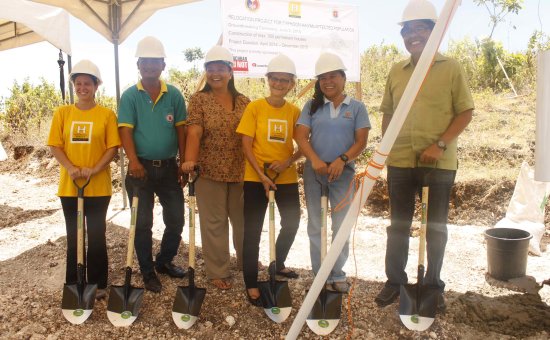|

BUILDING
A VILLAGE. (From left) HWA Project Manager Sussane Chylik, Maño
Brgy. Captain Eleazar Mahinay, Honorary Consul to Austria Julie
Vergara, HWA Managing Director Heide Burkhart, RAFI Integrated
Development Unit Executive Director Margaret Ann Gravador, and
San Remigio Mayor Mariano Martinez formally kickstarted work on
the relocation site in Barangay Maño, San Remigio through a
groundbreaking ceremony held last June 2. The project will
provide permanent homes to 300 families affected by the enforced
"no build zone" in the wake of Super Typhoon Yolanda. |
RAFI, Austrian org
begin work on Yolanda village
By Ramon Aboitiz
Foundation Inc.
August 21, 2014
CEBU CITY – Some 100
families who were survivors of Super Typhoon Yolanda will start
helping build their homes at a relocation site in Barangay Maño
provided by Hilfswerk Austria International (HWA), Ramon Aboitiz
Foundation Inc. (RAFI), and the local government of San Remigio, Cebu
next month.
They will form the first
batch of the 300 families identified as beneficiaries of the
relocation program conceptualized following the November 8 super
typhoon, which heavily damaged northern Cebu towns, including San
Remigio.
The “Filipino-Austrian
Village,” a pilot project of HWA in the country, is to be completed in
December 2015, with the first 100 families expected to start living in
the 2.9-hectare site in December this year. “At the end of August, we
should know the first batch of families moving into their new houses,
and also integrate them in the process of construction in September or
October,” HWA Project Manager Sussane Chylik said.
“The site development is
advancing fast despite the rocky soil. It is nearly finished for the
first 100 houses, as well as the staking of the lots, which were
enlarged to about 56 square meters per lot,” she added.
HWA is one of Austria's
leading organizations for development cooperation and humanitarian
aid. It is guided by the principles of sustainable development and
universal human rights. Through its projects and programs, it aims to
improve the lives and perspectives of beneficiaries.
“We are happy to work
together with these two committed partners (RAFI and San Remigio town)
for the benefit of the typhoon-hit families. Forming local
partnerships is crucial for the sustainability and the beneficiaries’
approval of development assistance. Thus, HWA always tries to form
close bonds with established organizations and to integrate our
projects in already existing and functioning networks,” Chylik said.
Last March 27, RAFI, HWA,
and the local government of San Remigio signed a Memorandum of
Agreement for the construction of permanent homes for 300 families
affected by the “no-build zone” strictly imposed in the aftermath of
Yolanda.
Less than three months
later, construction of the relocation site formally started with a
groundbreaking ceremony on June 2, which was attended by Honorary
Consul to Austria Julie Vergara, San Remigio Mayor Mariano Martinez,
HWA Managing Director Heide Burkhart, and RAFI Integrated Development
Unit Executive Director Margaret Ann Gravador.
The town, among other
responsibilities stipulated in the agreement, provided the location
for the houses. It will also provide professional training to 100 of
the beneficiaries and offer them jobs at the construction site.
The town will also provide
the heavy equipment and the plans in the construction of the houses
and the development of infrastructure.
RAFI, for its part, acts as
facilitator and evaluator of the program by monitoring the
implementation, profiling the beneficiaries, and gathering baseline
data. Aside from providing the funds for the construction of the
houses, HWA will also provide technical supervision during the
construction of houses, including the assignment of an overall project
manager.
Once the first 100 families
have been selected and informed, RAFI will closely work with them so
they can take part in the construction of their homes. This way, the
families will also develop early on a sense of ownership of their new
homes. “This kind of ‘sweat equity’ is an important contribution by
the beneficiaries to the project as they will feel responsible for
their community and give a helping hand to the activities on site,”
Chylik said.
This will also give an
opportunity for HWA and RAFI to get to know the beneficiaries better
to identify future leaders who can lead the new community.
To ensure sustainability,
the design and construction of the permanent houses use the solid
Interlocking Compressed Earth Block (ICEB) bricks pioneered by the
University of San Carlos and RAFI, instead of non-durable materials
like plywood. A roofed production site for the ICEB production has
also been constructed on site to shield the beneficiaries from the
elements while making the blocks.
“Our intention is to reduce
the beneficiaries’ vulnerability against future disasters,” Chylik
said.
The beneficiaries are chosen
based on the following criteria:
• The house has been
completely destroyed by the typhoon and is uninhabitable.
• The family does not
receive adequate assistance for house repair/reconstruction.
• Current residence is
within the “no build zone.”
• The family does not own
the house they are currently living in.
• The family is willing to
be relocated.
• The household is headed by
a female.
• The family is taking care
of an elderly (aged 60 or above).
• The family is taking care
of people with disabilities (PWDs).
• The beneficiary is
endorsed by the LGU.
Chylik said that the
beneficiaries will also receive livelihood workshops and training “to
avoid dependence upon external aid.” “It is not just relocating them
but also leaving something behind for them (after we go)," added Ma.
Elena Carnacer, RAFI’s coordinator for the relocation project.